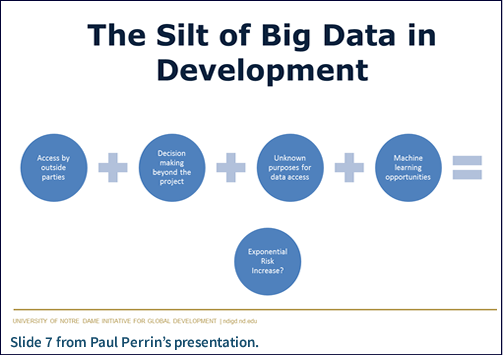I had the opportunity to attend MERL Tech (September 7-8, 2017 Washington, DC). I was struck by the number of very thoughtful and content driven sessions. Coming from an IT/technology perspective, it was so refreshing to hear about the intersection of technology and humanitarian programs and how technology can provide the tools and data to positively impact decision making.
One of the sessions, “Big data, big problems, big solutions: Incorporating responsible data principles in institutional data management” was particularly poignant. The session was presented by Paul Perrin from University of Notre Dame, Alvaro Cobo & Jeff Lundberg from Catholic Relief Services and Gillian Kerr from LogicalOutcomes. The overall theme of the presentation was that in the field of evaluation and ICT4D, we must be thoughtful, diligent and take responsibility for protecting people’s personal and patient data; the potential risk for having a data breach is very high.
 Paul started the session by highlighting the fact that data breaches which expose our personal data, credit card information and health information have become a common occurrence. He brought the conversation back to monitoring and evaluation and research and the gray area between the two, leading to confusion about data privacy. Paul’s argument is that evaluation data is used for research later in a project without proper approval of those receiving services. The risk for misuse and incorrect data handling increases significantly.
Paul started the session by highlighting the fact that data breaches which expose our personal data, credit card information and health information have become a common occurrence. He brought the conversation back to monitoring and evaluation and research and the gray area between the two, leading to confusion about data privacy. Paul’s argument is that evaluation data is used for research later in a project without proper approval of those receiving services. The risk for misuse and incorrect data handling increases significantly.
Alvro and Jeff talked about a CRS data warehousing project and how they have made data security and data privacy a key focus. The team looked at the data lifecycle – repository design, data collection, storage, utilization, sharing and retention/destruction – and they are applying best data security practices throughout. And finally, Gillian described the very concerning situation that at NGOs, M&E practitioners may not be aware of data security and privacy best practices or don’t have the funds to correctly meet minimum security standards and leave this critical data aspect behind as “too complicated to deal with.”
The presentation team advocates for the following:
- Deeper commitment to informed consent
- Reasoned use of identifiers
- Need to know vs. nice to know
- Data security and privacy protocols
- Data use agreements and protocols for outside parties
- Revisit NGO primary and secondary data IRB requirements
This message resonated with me in a surprising way. Project Balance specializes in developing data collection applications, data warehousing and data visualization. When we embark on a project we are careful to make sure that sensitive data is handled securely and that client/patient data is de-identified appropriately. We make sure that client data can only be viewed by those that should have access; that tables or fields within tables that hold identifying information are encrypted. Encryption is used for internet data transmission and depending on the application the entire database may be encrypted. And in some cases the data capture form that holds a client’s personal and identifying information may require that the user of the system re-log in.
After hearing the presentation I realized Project Balance could do better. As part of our regular software requirements management process, we will now create a separate and specialized data security and privacy plan document, which will enhance our current process. By making this a defined requirements gathering step, the importance of data security and privacy will be highlighted and will help our customers address any gaps that are identified before the system is built.
Many thanks to the session presenters for bringing this topic to the fore and for inspiring me to improve our engagement process.




